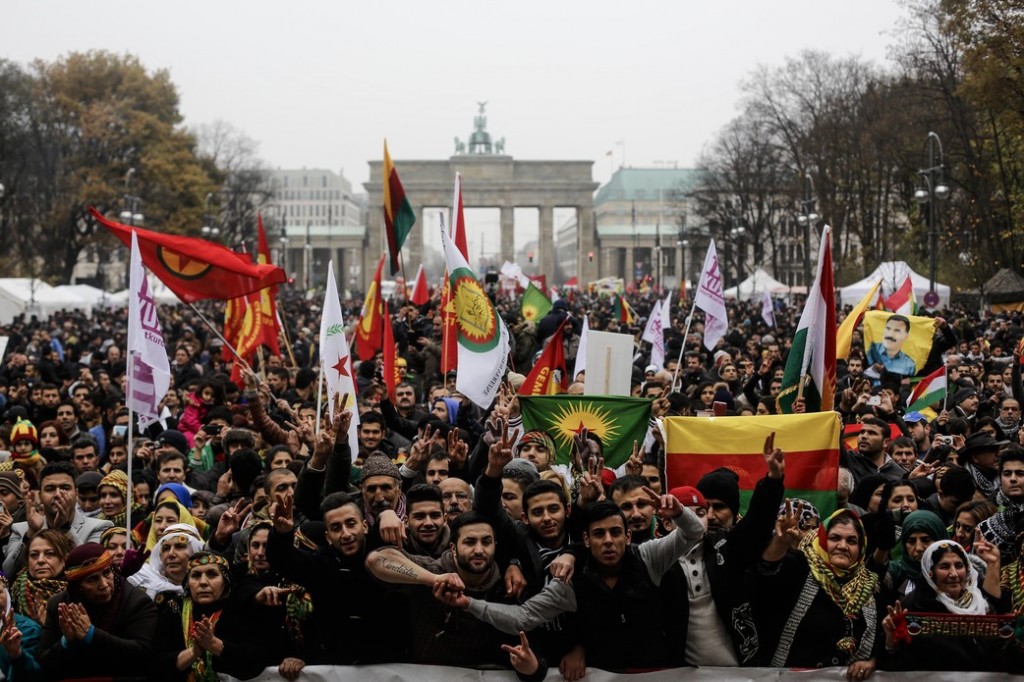UN Envoy to Syria Appeals to Turkey: Allow Kurds to Defend Kobanê
The fierce battle between the terrorist group Islamic State (IS) and the Kurdish military forces (YPG, YPJ) for Kobanê has now entered its fourth week. Kobanê is one of three cantons in the Kurdish region of Rojava (in Northern Syria) which declared autonomy in November, 2013.
IS intensified its offensive against Kobanê due to its strategic location on the border with Turkey and its position north of Raqqa, a base for Islamic State. IS considers the Kurdish fighters one of its greatest enemies. In August, the terrorist group caused a humanitarian tragedy when it massacred, persecuted and raped thousands of Yezidi Kurds and others considered apostates by the Islamic State.
The UN reports that more than 170,000 people have fled from the town of Kobanê to escape the attacks by IS. While a coalition against IS led by the US is bombing IS targets, the government has openly said it is not likely that the air strikes will help Kurds win against IS.
Staffan de Mistura, UN’s special envoy to Syria, said today that Kobanê has been under constant attack from IS for three weeks and that its inhabitants have stayed to resist. He continued to say that around 700 civilians, most of them elderly people, remain in Kobanê while 10-13,000 people are caught between the border of Turkey and Syria. Pointing at the only remaining entry and exit point to Kobanê on a map, Mr. Mistura said:
If Kobane/Ayn Al Arab falls, and this could happen, […] the 700 people, and if they (IS) move a little bit further, the 12,000 civilians apart from the fighters will be most likely massacred.
When there is an imminent threat to civilians, we cannot, we should not be silent. There is a lot of political reasons, strategical reasons that may indicate it is difficult to do something about it but the Secretary General has clearly made a statement saying anyone who can do anything, please take action into protecting the civilians, in this case of Kobanê/Ayn Al Arab.
Speaking of what the UN can do while respecting international law and sovereignty of state, Mr. Mistura said:
We would like to appeal to the Turkish authorities. In order to allow the flow of volunteers, at least, and their own equipment in order to be able to enter the city and contribute to a self-defence operation and if they can, to support the deterring acts of the coalition through whatever means from their own territory.
Kobanê, Mr. Mistura said, does not have enough time. He appealed to Turkey to take action soon, otherwise everyone including Turkey would regret the consequences. If Kobanê falls, there will be close to 400 kilometers of the Turkish border under the control of IS, he said, and it would be a missed opportunity to stop IS.
What will be next, Mr. Mistura asked, other villages? Even Aleppo? Mr. Mistura ended his speech by saying the UN will not allow a tragedy like the siege of Srebrenica to happen again, repeating what he had said earlier in his statement about the massacre in the Bosnian town of Srebrenica in 1995 when 8,000 Muslims were killed:
“Do you remember Srebrenica? We do. We never forgot and probably we never forgave ourselves.”
Kurds Unite for Kobanê, Fear Massacre by IS
On October 7, Erdogan said that Kobanê would fall into the hands of IS. Having ordered tanks and soldiers at the border to Syria, the Turkish government said it would help Kobanê yet has so far remained passive. Turkish forces have instead focused on attacking Kurdish protesters at the border, wishing to join their fellow Kurds in the fight against IS or help family members still stuck in Kobanê get out, with tear gas.
Turkey is reluctant to allow Kurds or equipment to enter Kobanê from Turkey as it fears it will strengthen the Kurdish military force.
Kurds have gathered in cities all over the world to protest IS and declare their support for their fellow Kurds fighting IS’ advances. They fear another massacre will happen if the Kurdish forces are not aided in their defence against IS.

Photo: TT Bild, Nyheter24.se
Kurds in Turkey have also taken to the streets to express their anger with the Turkish government preventing them from crossing the border into Kobanê and joining the Kurdish forces. They accuse the government of supporting IS. Violent clashes began between Turkish police and the protesters on Tuesday, causing the deaths of at least 31 people. Curfews have been imposed in Kurdish cities and more than 1,000 people have been arrested.
Disturbing images of IS’ supporters in the streets wielding long sticks have been shared on social media, some standing close to Turkish police.
Dexter Filkins writes for The New Yorker that
Indeed, some Turks are so hostile to the Kurds that they have thrown their sympathies in this battle behind ISIS: during a recent gathering of Kurdish protesters in Ankara, the Turkish capital, Turkish police moved in holding their index fingers in the air—the same symbol that ISIS militants use when beheading prisoners.
Turkey’s transportation minister announced that Turkey in cooperation with Twitter withheld “provocative tweets against Turkey’s national security” since the Kurdish protests in solidarity with Kobanê erupted, accusing the Kurdish youth of “destroying” and inviting to armed struggle.
Meanwhile, a Kurdish man was lynched by a mob in Istanbul who left him naked and severely wounded in the street. There have been several more reports of attacks on Kurdish or pro-Kurdish protesters who were either killed, wounded, arrested or had to seek shelter.

AFP
Comments are closed.